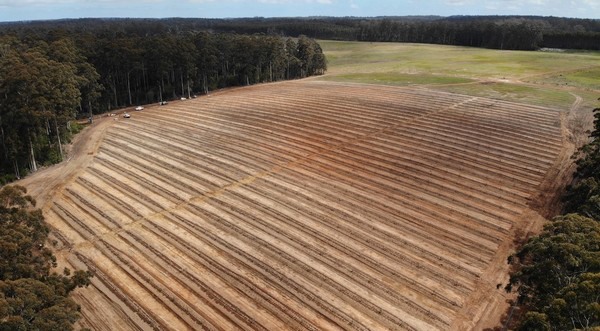Last week agricultural asset developer and manager Alterra Ltd announced it had completed the feasibility study for its planned 300-hectare avocado project located in Pemberton, Western Australia.
The feasibility study confirms the viability of the project over a 30-year life span and construction has started on 4.1 gigalitre dam to irrigate the project. After strong tree growth observed in initial 5-hectare 2020 planting, a 50-hectare planting is planned for 2021 subject to availability of funding.
Growing avocados in Pemberton, Western Australia gives a good supply window when the rest of the country has limited supply.

“We have a unique production environment here in Western Australia, we can produce avocados from September to February when supply is limited from the rest of the country,” explains Oliver Barnes, Alterra CEO. "It will also be one of the largest avocado growing sites in the region once developed. The fruit holds on the tree longer which gives a premium fruit with a high oil content, demand for this type of product is extremely high. We are not marketers ourselves so will partner with others in the industry and look at markets such as Asia – Singapore, Hong Kong and Japan where we see a lot of possibilities.”
The variety produced will be Hass.
“The trees typically start to yield in year three so we expect to see the first commercial crop in 2023 onwards with big volumes coming in around 2028. We have modelled the long term yields at 27 tons per hectare so from a 300 hectare project we expect yields of over 8000 tons.
Alterra have partnered with the French’s Group who have grown avocados in Pemberton for 35 years.
“We have used a lot of their systems and best practices, our model as a corporation is that wherever we work we look to partner with a local grower to access that local and generational knowledge. So, we have studied what they have done over those 35 years and Alterra have access to their historic data and the next 15 years of data that will come from that orchard. What we have identified are a number incremental improvements to further drive performance and we can introduce more current production methods and technology into the orchard.”
Alterra’s aim is to create industry benchmarks that better inform the Company’s avocado developments in the region and promote the wider adoption of precision farming practices that generate greater yields using less resources.
“For example, we have moved to a slow drip system which allows us to optimise both the irrigation and fertigation to the tree, this is really the engine for yield production. That foundation will allow us to customise how we treat these trees on different soil types. In the initial 5-hectare planting we found four different soil types, so we have built irrigation
scheduling and algorithms around those different soil types which we will develop for the rest of the site. We see a lot of yield upside to this and we are analysing ways we can improve the water efficiency of avocado production by up to 30%.
Oliver says it is proven technology which has worked elsewhere, Alterra are working with global drip irrigation provider Netafim who have used this technology in Australia and all over the world, so it is a case of bringing the methods to the Pemberton region as well as building on what is already there.
As part of its data-driven approach to its development, Alterra has installed remote access management and monitoring systems including an onsite weather station and field sensors, which will support the management decisions on irrigation, water usage and fertigation.
Water collection
This project has surface water but also a number its own spring sources and upstream is 26 km2 catchment of forest so the water is untouched and naturally filtered which flows onto the property so this water will be collected at the dam site and banked with the other water sources present.
“The dam is fully licenced for construction, we can use the water that otherwise would have been lost to bring high value activity to the land, driving production and creating more employment opportunities.
This method of finding projects which have undeveloped water assets and already hold the required water permits and licenses is what Alterra is particularly focussed on and according to Oliver, avocados is an excellent way to use this water.
“We think it is a highly ethical way so grow healthy plant-based food, but it also employs a lot of people. We are not buyers or speculators; we partner with landowners who already have land with water development potential and adopt them through our structure. At the first stage we take a really detailed look at the potential water asset and what its limiting factors are and address those in the design of the dam. It’s an opportune time to get things right before you then go on and manage that orchard for 30+ years. The way we have structured our model creates opportunities for investment directly into the project itself. Alterra is able to bridge the gap between landowners seeking capital to reposition land as well as creating pathways for capital providers to access premium agricultural assets and invest in projects with a positive environmental and social impact.”
For more information:
Tessa Dempster
Alterra
Tel: +61 8 9204 8400
Email: communications@alterra.com.au
www.alterra.com.au
